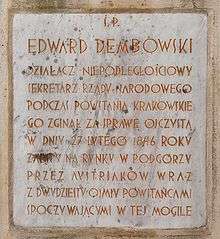Edward Dembowski

Edward Dembowski (25 April or 31 May 1822 – 27 February 1846) was a Polish philosopher, literary critic, journalist, and leftist independence activist.[1]
Life
Edward Dembowski was the son of Julia, née Kochanowska, and a conservative castellan-voivode of the Congress Poland, Leon Dembowski. On account of Edward's szlachta origins and contrasting radical social views, he was called "the red castellan's-son."
Dembowski published Przegląd Naukowy (The Learned Review), a journal for young, independence-minded intelligentsia.
In 1842–43 Dembowski conducted underground revolutionary activities in the Russian-ruled Congress Poland. Later, being at risk of arrest by Russian authorities, he transferred to Prussian-ruled Greater Poland.[1]
During the 1846 Kraków Uprising, Dembowski was secretary to dictator Jan Tyssowski. Dembowski died on 27 February 1846 at Podgórze, shot by Austrian troops as he was leading a procession to conduct agitation among the peasants.[1]
In his philosophical views, Dembowski was a leftist Hegelian.[2]
See also
Notes
- 1 2 3 "Dembowski, Edward," Encyklopedia Polski (Encyclopedia of Poland), p. 128.
- ↑ Tatarkiewicz, Zarys..., p. 24.
References
- "Dembowski, Edward," Encyklopedia Polski (Encyclopedia of Poland), Kraków, Wydawnictwo Ryszard Kluszczyński, 1996, ISBN 83-86328-60-6, p. 128.
- Władysław Tatarkiewicz, Zarys dziejów filozofii w Polsce (A Brief History of Philosophy in Poland), [in the series:] Historia nauki polskiej w monografiach (History of Polish Learning in Monographs), [volume] XXXII, Kraków, Polska Akademia Umiejętności (Polish Academy of Learning), 1948. This monograph draws from pertinent sections in earlier editions of the author's Historia filozofii (History of Philosophy).
- Leszek Sykulski, Edward Dembowski (1822–1846). Biografia polityczna (Edward Dembowski (1822–1846: A Political Biography), Toruń, Wydawnictwo Naukowe Grado, 2006.
- Obraz literatury polskiej XIX i XX wieku. Seria 3. Literatura krajowa w okresie romantyzmu: 1831-1863 (Polish Literature of the 19th and 20th Centuries. Series 3: Literature in the Romantic Period: 1831–1863), vol. 2.
|